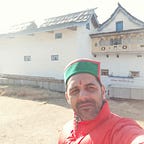Kantara movie has Himachal connection
Recently I watched Kantara movie on Amazon Prime. I was waiting for its Hindi version, but I was very excited about the movie because of its popularity so decided to watch in Kannada. Believe me, it is worth watching, one of the best movies I have watched in recent times.
Interesting thing is, I belong to Himachal closer to Himalayas, still I was able to quickly grasp the subject and emotion behind the movie. I was able to relate this movie to my traditions here. My understanding of the story is it is based on the folktale in coastal Karnataka about the local traditions and beliefs about Deities. The makers of this movie have done tremendous job by taking this subject to the mass level through this movie.
Movie talks about the people beliefs about Deities (Devta's) in India. Although this movie shows the traditions of one part of India, but I can certainly say the same belief systems we have in Himachal for ages. Himachal is known as Dev Bhoomi (meaning land of Devta's) we pratice these traditions in our day to day lives here. I am sure the same traditions and belief system we have in other parts of India as well.
Generally, in Urban areas in India, most people know about universal gods in Hinduism. We have these temples everywhere but if we go to rural areas in India, we have these Deities like Gram Devta, Kul Devta, Ishta Devta etc. These spiritual practices we have been following in India for ages.
Movie Kantara also shows how these Deities are part of people’s lives. These Deities are worshipped by families, villages, communities for certain purposes like good crops, health, wealth etc. These Deities have certain energy forms and people follows the processes very strictly. In my own experience also in Himalayan region, people follow the processes and rituals of Deities in every festival. This devotion is another Spiritual experience which enhances our experience about life and Divine.
In movie, we can see how people have faith in the Deity, and it is this faith which gives them purpose in life. Here, in my area in Himachal also for every small work in the village, for any issues related to draught, rains, personal problems, people go to Deity for the solution. And believe me, it works because the energy forms created in the form of Deities in old times response to your queries. This is just another science in our Indian traditions which slowly people forgot over time. I would not say forgot, but the real purpose behind these practices were not clearly understood over time. These energy forms will respond to you if you follow the process and rituals of that particular Deity. We here in Himachal, have these practices since ages and that is why still today, people here are more connected to these traditions. People worship these Deities here mostly, although people also worship universal gods in Hinduism, but people have an emotional connect with the particular Deity (Devi/Devta) in their area.
The most emotional scene in the movie for me was in the end when the Deity possessed Shiva in the festival brings together the hands of the villagers and the officials in a gesture telling them to protect the forest with each other’s help. This shows the connect between the Deity and people. This shows how the Deity cares and guides his people about the forest and land which he belongs to. Here in Himachal also we have the deities which are part of our families since ages, and we have emotional connect with them.
It just depends on us how we are following the practices and rituals of these Deities, if we follow these practices with proper processes and devotion, this will open new dimensions of Spirituality which has always been in India for ages.
I am always fascinated by the Deities culture in Himachal, and when I watched Kantara movie, it just made me think that , in India we have very rich spiritual traditions, it’s just that we need to explore these, more we try to understand these traditions, more mystical things we can experience.
